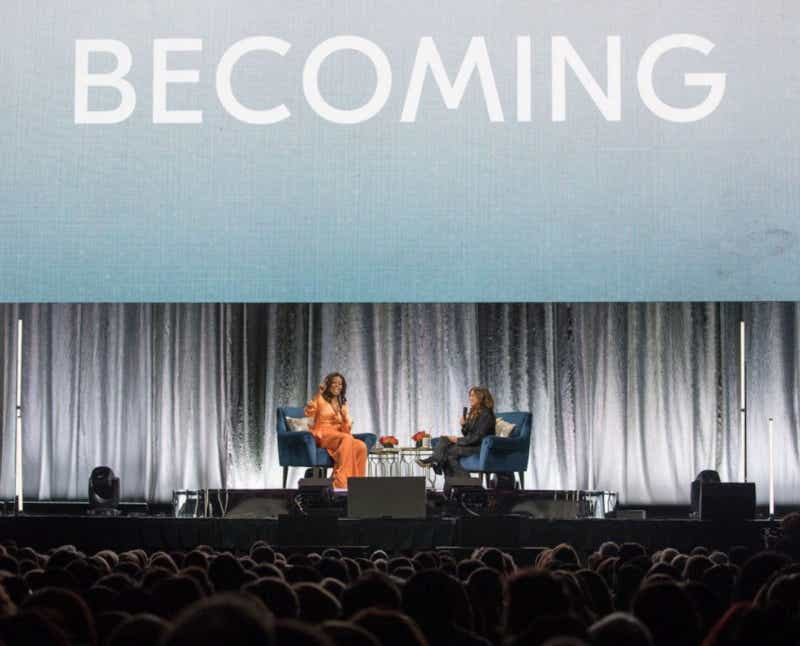The director on the special moments that went into making the popular Netflix documentary
Making a documentary about one of the most beloved women in the world is an extraordinary feat. And Nadia Hallgren — director of Becoming, the new documentary about Michelle Obama — wholeheartedly captures Obama’s essence. If you haven’t watched it already, put it on your list. Our producer Emily Pinto spoke with Nadia about how she landed this coveted job, her favorite memories from the road, and what she thinks is next for the former First Lady.
Wake-Up Call: How did you land the gig to make this documentary?
Nadia Hallgren: I’ve been a documentary cinematographer for over 15 years. In that time, one of the skills I’ve developed is that I can work alone, or with a very small crew. I was home one day, just sitting at my kitchen table, and I got a phone call from Priya Swaminathan of Higher Ground Productions. Priya had a friend who had worked with me before. They had told her that I had the ability to jump into any situation with a camera and just go with it. So she called and said, “I’m working with the Obamas. Mrs. Obama is getting ready to go on this book tour. We’re floating the idea of documenting it. We’re not sure what it would be — whether it would be for a film, or footage that would live in archives. Would you be interested in shooting it?” And the rest is history.
I imagine you got to know Michelle Obama quite intimately over the course of making this documentary. What is the most special memory you have with her? Did anything about her surprise you?
One thing that really surprised me is her sense of humor! She is incredibly funny. I didn’t expect to laugh so much when making this film. In some of the scenes of Obama with her mom, and her brother Craig, there’s this specific Robinson sense of humor.
There’s a scene in the film when she’s at her brother’s house. She loves to make jokes about how Craig is the favorite. So there’s a moment when Mrs. Robinson is talking about how much she loves the wine Craig serves, and she’s like, “What’s so special about his wine? I’ve got wine! Why isn’t my wine special!” We filmed for hours at Craig’s house that day, and one of the biggest challenges for me was holding the camera and trying to contain my laughter. When I think back on this crazy year making the film, I always have a big smile on my face.
A lot of the film shows her meeting with members of the public — both at book signings and at roundtables. Was there a particularly striking moment for you, as a filmmaker, when seeing her interact with someone?
She’s able to connect deeply with so many people — it’s not just young women, or women of color. We see her at one point with a group of senior citizens. And there were so many men who were huge fans of her book. But I think for young people, it’s especially profound to be able to sit across the table from her, and know that someone else can relate to the feelings they’re grappling with. And that someone is Michelle Obama!
When she would leave those rooms, I saw the confidence that she transferred to those young people. It was extraordinary — like a magical transfer of power through conversation. I had never seen anything like that before.
It was interesting to hear her talk about fashion, and how she uses it as a tool. Her fashion choices have been widely covered — is that something you intentionally wanted to work into the film?
She has spoken about fashion before, and we knew that it would be a great visual opportunity for the film. Obama’s fashion sense was very unique when she was first lady, but it evolved after she left the White House. There’s an extra layer of self expression i n it now.
On the tour, her outfits were a big topic of conversation for people. I thought it was incredible how she recognized that if the press were going to talk about her clothes, she could use that to her advantage. So she would wear a beautiful dress while standing next to a bunch of young women who are lacking education opportunities, and could use the conversation about her clothing to get people to pay more attention to the things that she cared about.
What do you think is next for her? Do you think she will run for office?
I can only speak to what I know for sure. She’s still very much working to educate girls around the world. That has always been a huge initiative for her, even after leaving the White House, through the Obama Foundation. She’s also dedicated to nurturing young leaders around the world. Those are two things that she continues to work on. They are incredibly important to her.
This interview has been edited and condensed.
This originally appeared on Medium.com









